Machines may not replace doctors anytime soon, but healthcare professionals who use AI are very likely to replace those who don’t. Discover the examples of AI in healthcare and see how your organization can benefit from using predictive algorithms, computer vision techniques, or generative AI.
In this piece, we’ll discuss the role of AI implementation in medical sectors and present you with 10 great examples of artificial intelligence in healthcare that can powerfully transform your business, support your staff in administrative tasks, empower doctors with data analytics, and improve patient experience.
Let’s start!
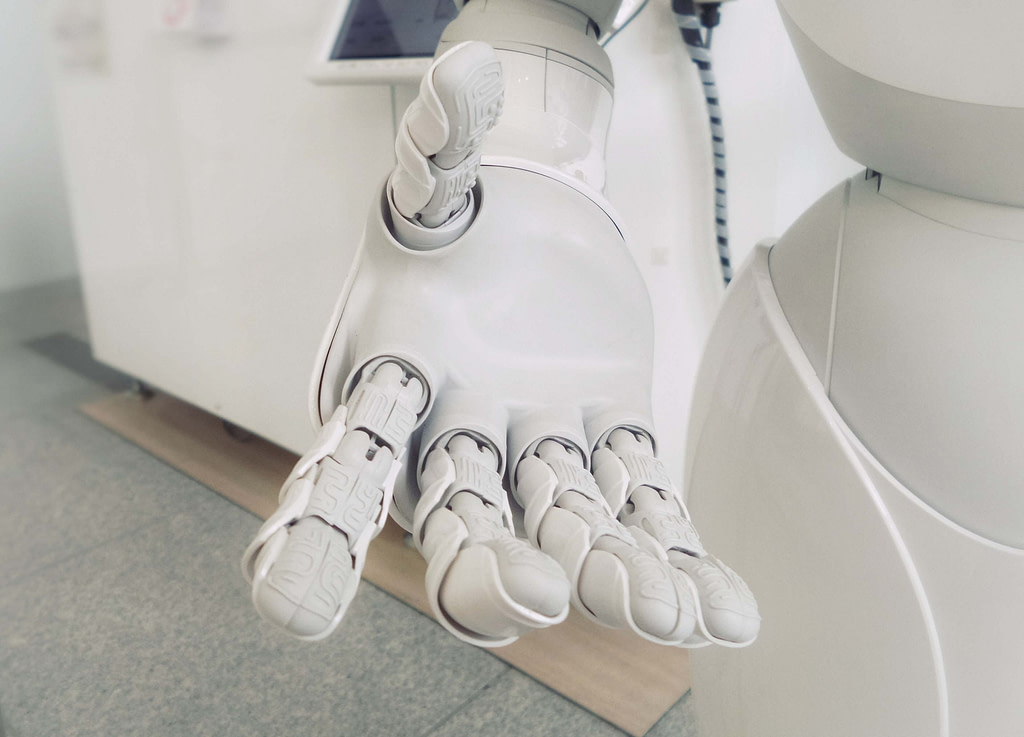
AI implementation in the healthcare sector
The AI-driven healthcare industry features sustainable and intensive growth with high chances for the investment’s annual growth. According to the report delivered by Mordor Intelligence, artificial intelligence in the global healthcare market value is about to reach 23.85 billion USD by 2025. Statistics have also shown that the CAGR for the sector totals 39.8% (for the dedicated study period 2018-2026).
These data are just like those renowned rays of light falling intentionally on the right path to follow for healthcare providers. Especially if we know the reasons standing right behind such statistics. Improved efficiency, speeding up the diagnostic process, boosting patient engagement are just ones from the long list of examples of artificial intelligence in healthcare that pose considerable value from the entrepreneur’s perspective. Yet, looking at the scale of the whole world, well, AI dominance, chiefly in healthcare, seems to be inevitable. Curious why?

What is the role of AI in healthcare projects?
Artificial intelligence uses algorithms that enable computers to recognize specific patterns in data analysis and draw conclusions. In healthcare, such software analyzes human cognition to find connections between various types of treatment plans and the following medical outcomes.
Everyone agrees that “better safe than sorry”. There is no greater reflection of that sentence than risk mitigation driven by AI in healthcare examples. Considering previous medical records (from other patients or from a particular case), applications of AI in medicine serve to predict and prevent diseases.
Different examples of artificial intelligence in healthcare elucidated significant functions and processes that AI can improve. Let’s take a look at them!
>>> Learn more more about AI development services
Improving efficiency and accuracy of the diagnostic process
The study conducted by BMJ Quality & Safety has shown that, in the United States, over 12 million adults are misdiagnosed each year. It means that 1 out of 20 adult patients receive the wrong diagnosis. Such a situation influences not only the course of a certain disease but also subsequent medical outcomes. It can also lead to other misdiagnoses as, even if you change healthcare provider, doctors rely on your previous medical records (which can be inaccurate).
But one rarely can, in good conscience, blame the doctor or anyone else. Because no one is in a machine. Except for artificial intelligence, which is, obviously, a machine. AI in healthcare examples provides benefits to the diagnostic process, thus increasing the efficiency of the whole treatment. It takes into account much more data than a human can, so it can provide correct disease diagnosis before evident symptoms take their toll. For instance, finding hints for diabetics retinopathy on the base of eye images.
Even the best well-thought improvements cannot be made without a good start with the right diagnosis. And AI can handle it on your behalf faster and at lower costs.
>>> Read also: Solving healthcare problems with AI
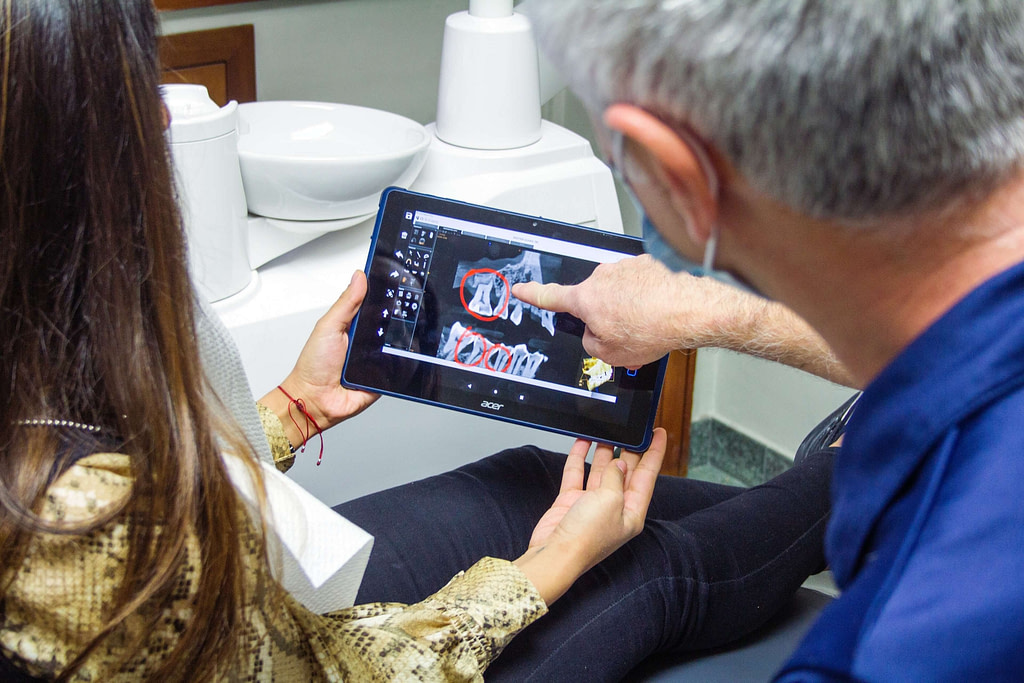
Enhancing customer service
Urban legends do not provide us with a positive opinion about healthcare services. People are more likely to complain about long queues and never-ending referrals to other specialists than to brag about how appointive their doctors are. In healthcare, as in every business, time is money. And the lack of time results in the absence of proper service engagement.
Examples of AI in healthcare often involve enhancing customer satisfaction. We all know platforms, where patients can make an appointment via computers or mobile devices instead of waiting dozens of minutes on a hotline. AI brings these platforms to a new level. Patients do not have to visit a doctor just to check their condition as long as they use apps that provide real-time health monitoring. They can also communicate with a doctor with the help of medical platforms that reduce time spent staring at shoes in the queue.
>>> Read also: Predictive analytics in healthcare – how to improve the efficiency of a clinic?

Speeding up medicine development
Although the vision of developing a bespoke diagnosis & personalized medical approach is tempting, it would be roughly helpful if we still have just one or two courses to choose from. Unfortunately, research has shown that a challenging part of circa 2.6 billion dollars assigned to drug development is lost irrevocably on behalf of testing, errors, and regulations. But don’t worry!
Wind of change hustle loudly also in the area of newly developed drugs. AI Examples in healthcare analyze massive bytes of data to accelerate medicine development. So it happens that enormous pharmaceutical companies hire smaller AI-driven startups focused on finding new ways, paths, and gaps for drug development. Why?
Every innovation involves the time and costs of departments dedicated to research and development. This rule is being applied to whatever we think of innovation in batteries, education systems, or healthcare. Use cases of AI in healthcare can be applied to every stage of drug development to:
- Reduce the costs of the research.
- Avoid human mistakes and check if calculations are correct.
- Identify significant areas for improvement, needed intervention.
- Discovering candidates and stimulating connections finding,
- Speeding up tests, and, as a result,
- Classify biomarkers to identify, for instance, risk factors for developing a disease.
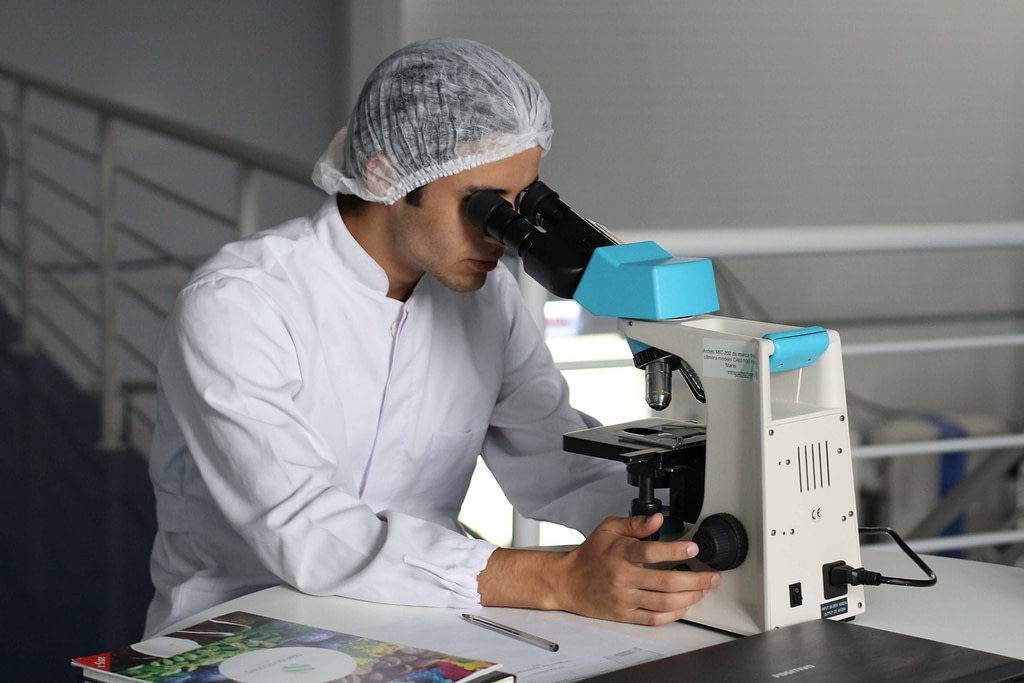
Providing personalized medical approaches and services
Examples of artificial intelligence in healthcare have shown the possibility of predicting a patient’s specific response to a considered medicine application. Thanks to the cross-transfer of referenced data of patients bringing similar complaints, the system compares the conditions, treatments, and the flow of courses. It results in a personalized medical approach offering plenty of treatment options considered on the point of specific factors.
Developing new tools for medical research
Medical applications of AI in the healthcare industry find their niche, especially in genome-based diagnostics. They are genome sequencing and annotation, where algorithms try to recognize common patterns to develop solutions for parts to be improved. But, for some companies, there is no need to edit genes to have an AI-driven attitude in their veins.
An example of artificial intelligence in healthcare associated with developing new tools is using natural language processing (NLP) or generative AI to speed up clinical trials. Thanks to sharing patients’ medical history available from various sources, we can structure high-dimensional graphs which allow patient identification and high-advanced patient-to-disease matching.
Read more about the benefits of using AI in healthcare.
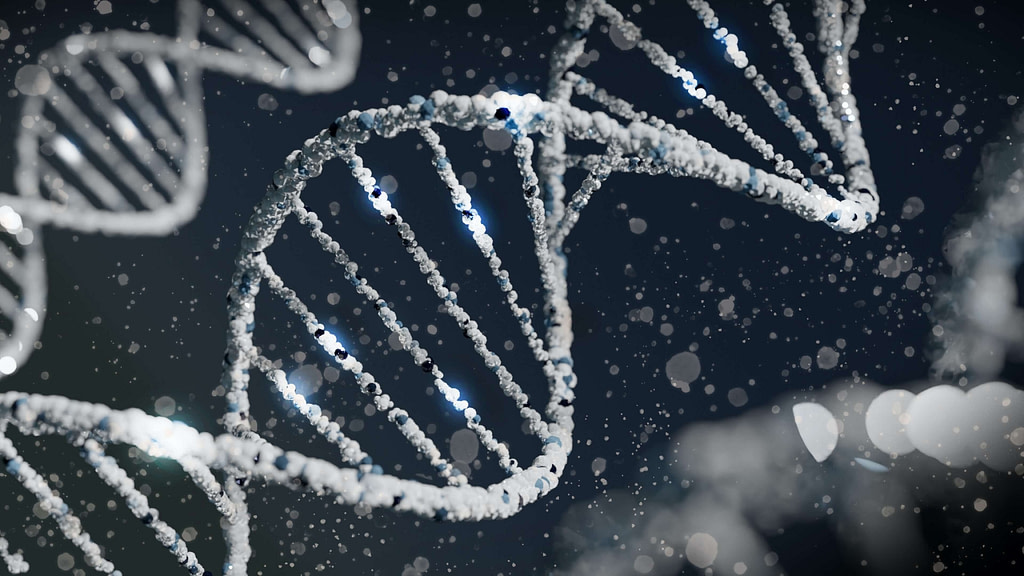
Medical fields where AI might be very helpful
How is artificial intelligence used in healthcare? AI application in medicine uses mainly algorithms that read numerical or image-based data and (including, for instance, information about heart rate or MRI scans) prepare required classification. Medical fields which turn out to be incredibly responsive to AI-handled skills are:
- surgery,
- nursing,
- administration ,
- others (such as drug development, radiology research, or risk management).
What are examples of artificial intelligence in healthcare?
Automating Administrative Tasks
AI makes life simple, allowing us to get rid of mundane, often frustrating tasks. For instance, single calls when a client is being informed about basic procedures. That is why the most down-to-earth applications of artificial intelligence in healthcare regard fulfilling administrative responsibilities. With the help of chat bots providing real-time assistance, patients communicate with AI-driven software to gain the information they need instead of directing their emails straight to reception. In addition, automation gives a deserved relief for healthcare organizations’ staff, which improves their job efficiency, performance, endorsement, but speeds up all the processes.
Check other examples of successful AI adoption in your business.

ML-based radiology results analysis
Do you wonder: what is a good example of AI in healthcare? You surely should think of radiology. Radiologists working in small groups struggle to obtain the most valuable information. Unfortunately, as long as the analysis is conducted by, let’s say 5 and often exhausted people, the outcome will always be subjective. That is why researchers often reach out for a variety of AI examples in healthcare.
Machine learning can analyze images such as computed tomography (CT) or magnetic resonance imaging (MRI) to track hidden connections down to provide data crucial for researchers, hospitals, and their clients. As a result, AI supports radiologists in automating daily administrative tasks, improves diagnostic accuracy, eliminates the risks of human errors, and lets researchers focus on complex cases.
Reducing diagnostic process with deep learning
Probably you know the character of Dr. House from a popular tv series? He is famous for his natural-born disease diagnosis talent and sarcastically distinguished sense of humor. Although artificial intelligence does not have enough life trauma to throw decadent jokes, it surpasses House’s diagnostic thinking.
Among examples of artificial intelligence in healthcare, deep learning is a promising technique for abnormality detection. It is widely used to augment the diagnostic process. Running deep learning experiments is, in total, much cheaper than hiring researchers for that purpose. AI is also less likely to make mistakes and provide inaccurate diagnoses, and even so, it is easy to check at what step the system commits an error. AI examples in healthcare support doctors in decision-making, thus speeding up and improving the whole diagnostic process.

Developing smart devices for medical tasks
The base for most medicine researchers is, foremost, tissue samples. But experts’ predictions indicate that thanks to artificial intelligence, an opportunity of inventing new medical tools arises. Innovative medical devices are a great example of AI technology used in healthcare concerning imaging tools. Their purpose is to screen chest x-rays in search of tuberculosis or cancer. This idea could be developed further as an app that would give healthcare providers a helpful hand while testing a niche lacking high-quality massive libraries.
Health risk assessment
The world is dynamic. More often, it is risk management (of an activity) to pose an essential field to measure rather than the activity itself. It stems from this mentioned dynamic itself as the number of factors to consider increases every year. That is why AI examples in healthcare often pertain to accurate risk assessment, for instance: the probability of getting resistance to antibiotics, identifying the suitable layers of risk stratification, or just possibilities for infection.
We live in a world where most people can travel abroad to different climate zones or use diets and exercises that are not exactly meant for their health condition. And so, a variety of risks arises due to the fact that there are more and more factors influencing our health. The rumor has it that humans can no longer analyze this data efficiently. But then they meet machine learning, and you know what it says? “You have my sword.” Well, at least, this is what we heard.

Real-time vitals monitoring and analysis
Artificial intelligence examples in medicine regard crucial health metrics monitoring and real-time analysis. To obtain a comparison, let’s say that you have 5 researchers in your hospital hired. All of their studies are static, it means: prepared on a scheduled date, concerning previously determined factors, with the prediction for, let’s say, 5 years. Analyzes prepared with the help of artificial intelligence are dynamic and real-time. If you need to consider two more factors, researchers have to add them to the system and monitor how results are calculated. If you want to span the number of years included in the prediction, you can do it with a few clicks. Of course, the system spots that the accuracy for each added year decreases, but the clue is that the analysis, once settled, can be easily adjusted to real-time needs.
Improving business decision-making
Examples of artificial intelligence in healthcare concern not only the scientific side of developing new tools, drugs and accelerating the diagnosis processes but also the business-related fields such as decision-making. Doctors can gain access to unheard-of insights to obtain a more profound sense of treatment variabilities. It stems from the transparency of the AI line of thinking.
We can also assume that the language of artificial intelligence is becoming more renowned across different fields and departments. It enables fluent communication across scientific fields and the business side. This compliance supports decision-making as both researchers and the management use similar words and points of view drawn up from the AI.
Read more about AI business applications.

Earlier cancer detection
If you ask anyone about the most desired drug to be developed, most people would probably pick a medicine for cancer treatment. Unfortunately, cancer is not a disease brought by a single virus or bacteria that needs to be eliminated to come back to health. Instead, cancer is driven by gene mutation, and medical efforts struggle to detect it on the first step rather than battle it at its gain of massive strength.
At Tulane University, a group of researchers used artificial intelligence to analyze tissue scans to accelerate the process of a cancer diagnosis. The research involved gathering 13.000 images of colorectal cancer from more than 8.000 subjects from independent medical centers located in Asia, Europe, and the United States. They developed a machine learning model that scored to be more accurate in diagnosis than the human doctors.
AI in healthcare examples is widely mentioned among the concerns of lung cancer detection. Ml-based health systems diagnose cancer more accurately than the experienced group of radiologists do. Here we think primarily about early-stage cancer detection, which is the field that most doctors are mainly focused on.
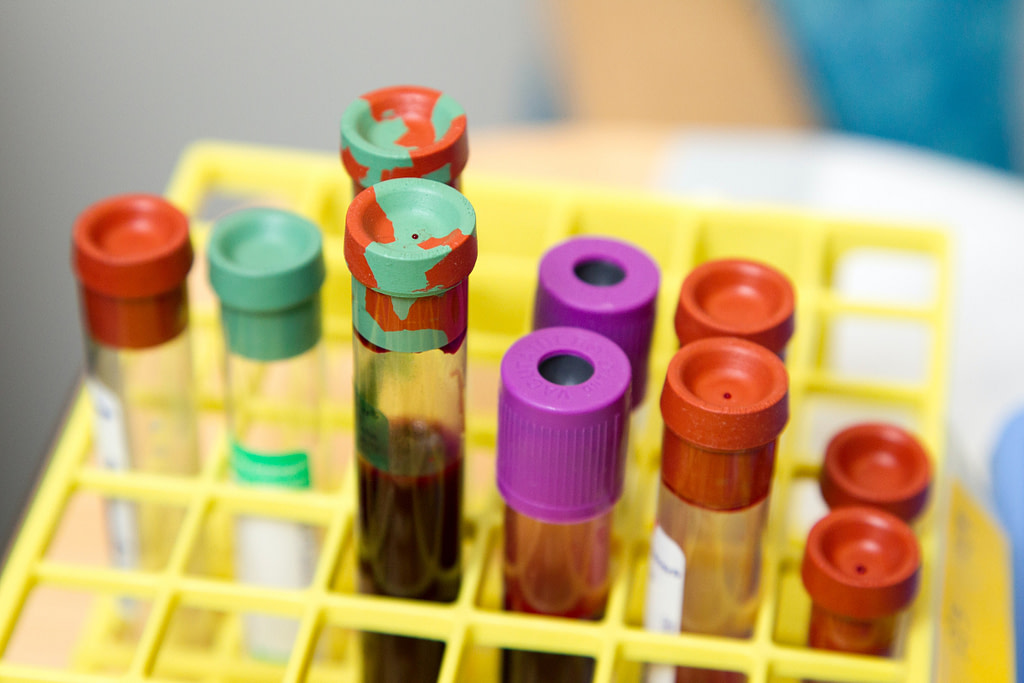
Leveraging neural network for clinical trials
Examples of artificial intelligence in healthcare also cover neural networks, for instance, AtomNet. The systems revolve around identifying patterns among bioactivity. Screening dozens of millions of genetic sequences daily, artificial neural networks provide insights faster and more efficiently than traditional researchers do. ANNS constitute animal brains, and, with the AI models devised for this purpose, imitate the possible behaviors of human neural networks.
Improving communication among the staff and patients
There are always more ill people than doctors to take care of them. The biggest challenge for healthcare is the lack of time. If we run out of time even for the diagnosis processes, we can’t even think of soft skills and manners such as well-thought communication. The studies have shown that the main complaint among patients is the low standard of client service.
To deal with this challenge, the application of AI in medicine concerns ways to solve the problem of poor communication. Systems struggle to reduce complex paperwork that stems from existing a variety of insurance coverage covering a variety of ailments and a variety of conditions based on which a service can or cannot be provided.
AI in healthcare examples that are meant for improving communication involves, for instance, platforms for automotive appointment systems, real-time health status monitoring (handy for chronic diseases such as diabetes), or developing patient engagement solutions.

Examples of using AI in healthcare sectors – summary
Artificial intelligence appears to be the future of healthcare, an industry where the main challenge is the lack of time and specialized researchers. Examples of artificial intelligence in healthcare concern speeding up and improving the efficiency of critical fields such as diagnosis, disease detection, health risk assessment, drug development, administration, and communication. It seems that if we combine the magnificent talent of researchers and doctors working by vocation with the predictive analysis and calculation skills of artificial intelligence, living in a life-threatening disease-free world is not a dream anymore. It is a fact that has been for ages expected and has now finally come into humanity’s view.
